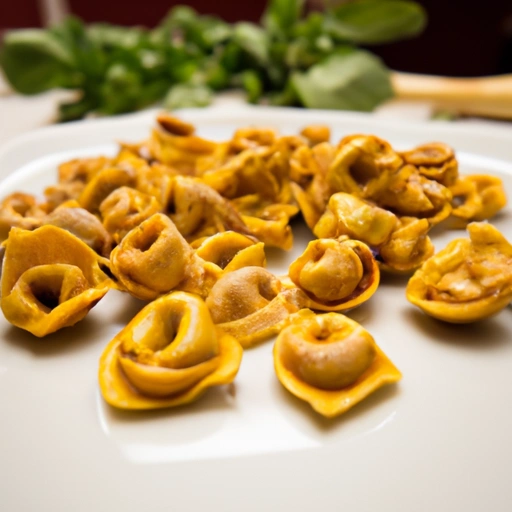Tortellini
Description

Tortellini are a small, ring-shaped pasta traditionally stuffed with a mix of meat (pork loin, raw prosciutto, or mortadella), Parmigiano Reggiano cheese, egg, and nutmeg. They originate from the Italian region of Emilia-Romagna, particularly the city of Bologna. The pasta is made by folding a square of dough over a filling to form a triangle, then curling the pasta around the finger to create its characteristic shape.
Common uses
Tortellini are commonly used in a variety of dishes, including soups like the classic 'tortellini in brodo' – tortellini served in a rich meat broth. They can also be served in a cream or tomato-based sauce, or drizzled with melted butter and sage. Tortellini are versatile enough for both casual family dinners and more sophisticated, festive spreads.
Nutritional value
Calories
One cup of cooked cheese tortellini (about 170 grams or 6 ounces) typically contains around 330 calories.
Protein
This serving size of tortellini can have approximately 14 grams (0.5 ounces) of protein.
Fat
The fat content is usually about 7 grams (0.25 ounces), but can vary depending on the filling and if it's served with a sauce.
Carbohydrates
Tortellini are rich in carbohydrates, with around 53 grams (1.9 ounces) per cup.
Vitamins
Tortellini may contain vitamins such as B-complex vitamins, depending on the type of flour used and the filling ingredients.
Minerals
They may also provide minerals like calcium and phosphorus from the cheese filling.
Health benefits
While tortellini are not typically considered a health food, they can be part of a balanced diet. They provide energy through carbohydrates and are a source of protein. When filled with cheese, they offer some calcium which is necessary for bone health.
Potential risks
For those with gluten sensitivity or celiac disease, traditional tortellini, which are made with wheat flour, are not advisable. Additionally, store-bought versions may contain preservatives or additives that some individuals may wish to avoid. High-calorie sauces can also contribute to excessive calorie intake.
Common recipes
Recipes featuring tortellini include soups, pasta salads, and main dishes served with Alfredo, marinara, or pesto sauce.
Cooking methods
Tortellini are usually boiled in salted water but can also be baked in casseroles.
Pairing with other ingredients
These stuffed pastas pair well with a variety of ingredients including mushrooms, peas, cured meats, and a variety of cheeses.
Summary
Tortellini is a versatile and beloved pasta with a rich history and a variety of uses in the kitchen. Whether in a simple broth or a luxurious sauce, tortellini brings Italian tradition and comforting flavors to the table.